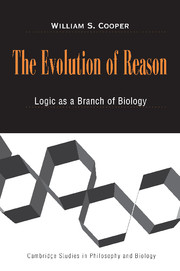Book contents
- Frontmatter
- Contents
- Foreword
- 1 The Biology of Logic
- 2 The Evolutionary Derivation of Life-History Strategy Theory
- 3 The Evolutionary Derivation of Decision Logic
- 4 The Evolutionary Derivation of Inductive Logic (Part I)
- 5 The Evolutionary Derivation of Deductive Logic
- 6 The Evolutionary Derivation of Inductive Logic (Part II)
- 7 The Evolutionary Derivation of Mathematics
- 8 Broadening the Evolutionary Foundation of Classical Logic
- 9 The Evolutionary Derivation of Nonclassical Logics
- 10 Radical Reductionism in Logic
- 11 Toward a Unified Science of Reason
- Appendix: Formal Theory
- References
- Index
4 - The Evolutionary Derivation of Inductive Logic (Part I)
Published online by Cambridge University Press: 18 December 2009
- Frontmatter
- Contents
- Foreword
- 1 The Biology of Logic
- 2 The Evolutionary Derivation of Life-History Strategy Theory
- 3 The Evolutionary Derivation of Decision Logic
- 4 The Evolutionary Derivation of Inductive Logic (Part I)
- 5 The Evolutionary Derivation of Deductive Logic
- 6 The Evolutionary Derivation of Inductive Logic (Part II)
- 7 The Evolutionary Derivation of Mathematics
- 8 Broadening the Evolutionary Foundation of Classical Logic
- 9 The Evolutionary Derivation of Nonclassical Logics
- 10 Radical Reductionism in Logic
- 11 Toward a Unified Science of Reason
- Appendix: Formal Theory
- References
- Index
Summary
This chapter retraces some of the steps of the last in order to reinforce the developments to this point with some formal theory. A theorem is provided to the effect that evolutionary theory gives rise to decision and utility theory as formalized by Leonard Savage (1972). The theorem shows that organisms with evolutionarily stable choice strategies conform to Savage's postulates for rational decision making. This makes decision-theoretic rationality demonstrably reducible to evolutionary considerations in a strong mathematical sense.
With the help of a second theorem it is shown that once decision-theoretic rationality has been established a theory of subjective probability is forthcoming. The Savage postulates are in fact well known as a foundation for a rigorous theory of subjective probability and utility based on choice behavior. Thus the evolutionary derivation of the Savage postulates yields not only the classical logic of decision, but also the rudiments of probabilistic or inductive logic, leading to the next rung up the reducibility ladder.
ACT REPRESENTATIONS
Since all cognitively interesting behavior can be analyzed in terms of choices among available acts or strategies, the first order of business in setting up a formal theory of decision is to settle upon mathematical representations for these entities. An abstract representation of an act is wanted that includes whatever it is about acts that is most germane to choice making.
For any problem of decision under uncertainty there is an associated set of possible states of Nature. A state of nature is what a biologist would think of as an environmental state or condition.
Information
- Type
- Chapter
- Information
- The Evolution of ReasonLogic as a Branch of Biology, pp. 69 - 89Publisher: Cambridge University PressPrint publication year: 2001
